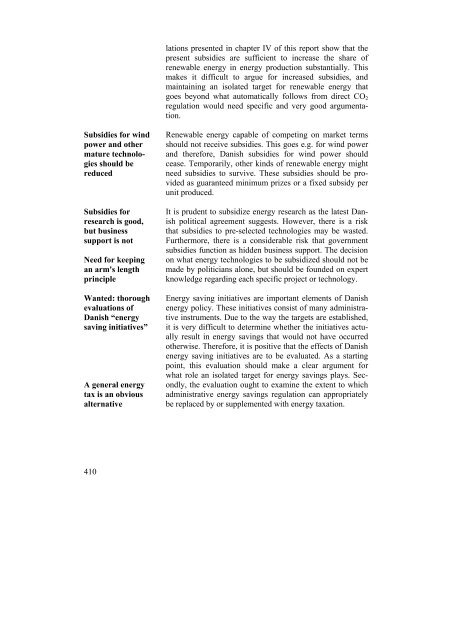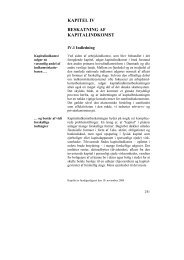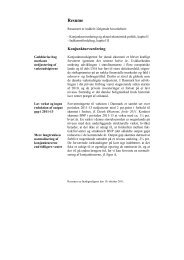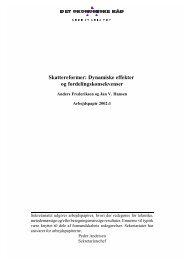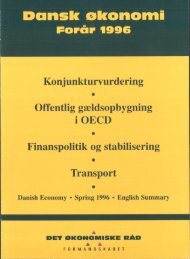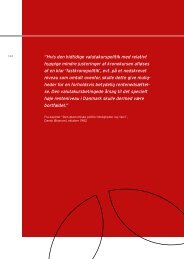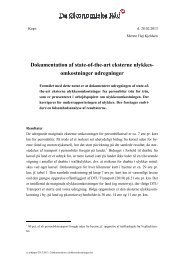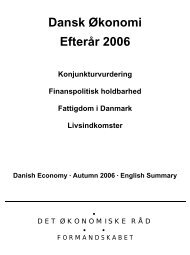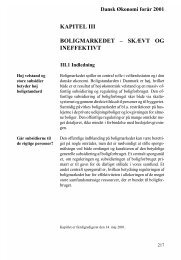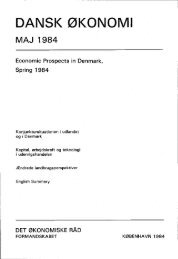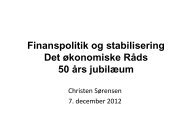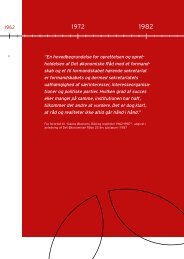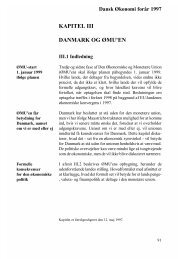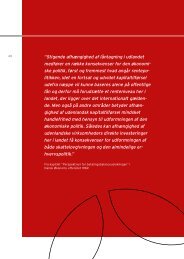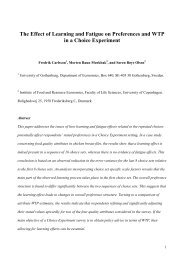- Page 1 and 2:
Diskussionsoplæg Klausuleret indti
- Page 3 and 4:
INDHOLD Resume 1 Kapitel I Miljøø
- Page 5 and 6:
To årlige miljøøkonomiske produk
- Page 7 and 8:
Tabel A Udvikling i indikatorer for
- Page 9 and 10:
Retningslinier for inddragelse af
- Page 11 and 12:
… er ikke et særligt dansk fæno
- Page 13 and 14:
imidlertid transport, hvor energiaf
- Page 15 and 16:
Samlet CO2udledning falder… … m
- Page 17 and 18:
Men forbrugerne får højere priser
- Page 19 and 20:
Risiko for at CO2mål ikke opfyldes
- Page 21 and 22:
Klimahensyn håndteres på EUniveau
- Page 23 and 24:
Støtte til vind og andre modne VEt
- Page 25:
Tabel C Eksempler på aktiviteter/m
- Page 28 and 29:
Sammenhæng mellem natur, miljø og
- Page 30 and 31:
Boks I.1 Eksempel: Beskrivelse af e
- Page 32 and 33:
Sammenhæng mellem partielle og mak
- Page 34 and 35:
Svag og stærk bæredygtighed Den i
- Page 36 and 37:
Sammenhæng mellem regulering og om
- Page 38 and 39:
Omsættelige kvoter Kvoter sikrer m
- Page 40 and 41:
Virkemidlet skal afspejle problemet
- Page 42 and 43:
Omfordelinger via det offentlige bu
- Page 44 and 45:
Relativt til BNP er offentlige milj
- Page 46 and 47:
Miljøområdet bidrager med netto 5
- Page 48 and 49:
Miljøøkonomisk rapport og konfere
- Page 50 and 51:
Fastsættelse af mål Miljøøkonom
- Page 52 and 53:
Sammensatte eller enkle indikatorer
- Page 54 and 55:
Luftforurening udgør et sundhedspr
- Page 56 and 57:
Kilder til luftforurening Internati
- Page 58 and 59:
Nettoeksport af kvælstofilter 54 F
- Page 60 and 61:
Skadernes omfang afhænger af tid o
- Page 62 and 63:
Klimaændringer kan få store konse
- Page 64 and 65:
Tabel I.3 Vigtigste kvantificerbare
- Page 66 and 67:
Regelstyring samt udledningslofter
- Page 68 and 69:
Udledning af svovldioxid som mål f
- Page 70 and 71:
NO2 er den sundhedsskadelige del Pr
- Page 72 and 73:
Stor reduktion i svovlforurening i
- Page 74 and 75:
2010-målene overholdes for ozon Fi
- Page 76 and 77:
Udledning af drivhusgasser er relev
- Page 78 and 79:
Figur I.20a Dansk middeltemperatur
- Page 80 and 81:
Mindre forsuring og eutrofiering af
- Page 82 and 83:
Ophør af gamle driftsformer Færre
- Page 84 and 85:
Mål om gunstig bevaringsstatus Sta
- Page 86 and 87:
Naturmål via regulering af landbru
- Page 88 and 89:
Påbud og subsidier i skovforvaltni
- Page 90 and 91:
Tilbagegang i lysåben natur og fre
- Page 92 and 93:
Det går langsomt fremad med skovar
- Page 94 and 95:
År 2000-mål for naturskov opfyldt
- Page 96 and 97:
Eutrofiering af søer, fjorde og ha
- Page 98 and 99:
Fiskeri Miljøfremmede stoffer Fra
- Page 100 and 101:
Vandmiljøplan III: Skærpede mål
- Page 102 and 103:
Indsats på bedriftsniveau har vær
- Page 104 and 105:
Indikatorer for både påvirkninger
- Page 106 and 107:
Stigende sigtdybde som resultat af
- Page 108 and 109:
Figur I.29a Koncentration af totalk
- Page 110 and 111:
Torskefiskeri og gydebiomasse som i
- Page 112 and 113:
Vandindvinding som indikator for pr
- Page 114 and 115:
Fiskebestande under pres Faldende v
- Page 116 and 117:
REACH - EU’s kemikaliestrategi Fo
- Page 118 and 119:
Regulering og arealbeskyttelse Øvr
- Page 120 and 121:
Behandlings- hyppighed steget til 5
- Page 122 and 123:
Imposex som indikator for miljøska
- Page 124 and 125:
Affaldsmængder fra sektorer Affald
- Page 126 and 127:
Stigende affaldsmængde fra hushold
- Page 128 and 129:
Retningslinier for inddragelse af
- Page 130 and 131:
Problemer med målopfyldelse Skadel
- Page 132 and 133:
Ozonkoncentration overholder 2010-m
- Page 134 and 135:
Forværring i økologisk areal Beho
- Page 136 and 137:
Effekt af vandmiljøplanerne, men l
- Page 138 and 139:
Målsætning om at anvende urenset
- Page 140 and 141:
136 Litteraturliste Bøgestrand, J.
- Page 142 and 143:
138 Fødevareministeriet (2004): Lo
- Page 144 and 145:
140 Miljøstyrelsen (2005): Samfund
- Page 146 and 147:
Afkobling af dansk energiforbrug og
- Page 148 and 149:
Indhold af dette kapitel Dansk ener
- Page 150 and 151:
Boks II.1 Kyoto-aftalen Kyoto-aftal
- Page 152 and 153:
Bekymring om stigende oliepriser Be
- Page 154 and 155:
EU’s energipolitik: 20 20 20 i å
- Page 156 and 157:
Boks II.3 EU’s kvotesystem Den 1.
- Page 158 and 159:
Færre gratiskvoter og mere auktion
- Page 160 and 161:
Tabel II.1 Dansk national allokerin
- Page 162 and 163:
158 Tabel II.2 Hovedtræk af energi
- Page 164 and 165:
Planer om kernekraft blev aflyst En
- Page 166 and 167:
Energi 21 - Reduktion af CO2-udledn
- Page 168 and 169:
Energibesparelser en vigtig del af
- Page 170 and 171:
Energiforbruget er faldet i forhold
- Page 172 and 173:
Ikke kun fald i energiintensiteten
- Page 174 and 175:
Figur II.7 Tilgang og anvendelse af
- Page 176 and 177:
Boks II.4 Energiopgørelser Der fin
- Page 178 and 179:
… faktisk energiforbrug … … o
- Page 180 and 181:
Husholdningerne står for ca. 40 pc
- Page 182 and 183:
Tabel II.3 Endeligt energiforbrug i
- Page 184 and 185:
Effekt af første oliekrise var kun
- Page 186 and 187:
Detaljeret analyse dekomponerer udv
- Page 188 and 189:
Boks II.5 Dekomponering af erhverve
- Page 190 and 191:
Bunkring er den primære forskel p
- Page 192 and 193:
Faldende CO2intensitet Kul dominere
- Page 194 and 195:
Stigning i CO2udledning fra privatb
- Page 196 and 197:
Fald i energiintensitet trækker CO
- Page 198 and 199:
Boks II.6 Dekomponering af erhverve
- Page 200 and 201:
Vandkraft giver lavere CO2intensite
- Page 202 and 203:
Boks II.7 Opgørelser af CO2-udledn
- Page 204 and 205:
Produktions- eller forbrugsrelatere
- Page 206 and 207:
Systematisk eleksport giver niveauf
- Page 208 and 209:
Boks II.8 EMMA Fremskrivningen af e
- Page 210 and 211:
Energieffektiviteten antages at for
- Page 212 and 213:
Boks II.9 Forudsætning om væksten
- Page 214 and 215:
Stigende endeligt energiforbrug 200
- Page 216 and 217:
Lidt lavere direkte CO2-udledning O
- Page 218 and 219:
Fald i energiintensiteterne har sto
- Page 220 and 221:
Højere energiforbrug end i Energis
- Page 222 and 223:
Forskel i varmeforbrug især pga. k
- Page 224 and 225:
Nettoeksport af el 220 get af prim
- Page 226 and 227:
Konstant bruttoenergiforbrug Konver
- Page 228 and 229:
Markante forskelle til Energistyrel
- Page 230 and 231:
Endeligt energiforbrug stiger …
- Page 232 and 233:
CO2-afkoblingen skyldes skift til n
- Page 234 and 235:
Energipolitiske målsætninger: - F
- Page 236 and 237:
Mål for VE og fossile brændstoffe
- Page 238 and 239:
Andre mål vedrører VE og energibe
- Page 240 and 241:
236 Litteraturliste Danmarks Statis
- Page 242 and 243:
238
- Page 244 and 245:
Hvordan opnås begge mål? Der foku
- Page 246 and 247:
Miljøeffekter kan være både loka
- Page 248 and 249:
CO2-kvoter ændrer rammerne for ene
- Page 250 and 251:
Nationale CO2reduktioner på det kv
- Page 252 and 253:
Den danske regulering omfatter mang
- Page 254 and 255:
Boks III.2 Anvendte virkemidler i f
- Page 256 and 257:
Energiafgifterne fylder mest Skatte
- Page 258 and 259:
Energibeskatningen udgør en væsen
- Page 260 and 261:
Nettoprovenuvirkning af miljøregul
- Page 262 and 263:
Mange forsyningsvirksomheder er off
- Page 264 and 265:
260 Tabel III.5 Karakterisering af
- Page 266 and 267:
Afvejning mellem fleksibilitet og u
- Page 268 and 269:
Ens afgift sikrer samme marginale o
- Page 270 and 271:
Offentlige indtægter kan være for
- Page 272 and 273:
Stærkt argument for international
- Page 274 and 275:
Gratis uddeling af kvoter sidestill
- Page 276 and 277:
Indtægter fra miljøregulering er
- Page 278 and 279:
Manglende koordinering af indsatsen
- Page 280 and 281:
Velfærdseffekten af produktion kan
- Page 282 and 283:
CO2-kvotemarked ændrer betingelser
- Page 284 and 285:
Tabel III.6 Overblik over dansk ene
- Page 286 and 287:
Boks III.3 Definition af energiinte
- Page 288 and 289:
Netafgift Stor forskel i elprisen m
- Page 290 and 291:
Boks III.4 Administrativ regulering
- Page 292 and 293:
Besparelse ved reduktion af CO2 st
- Page 294 and 295:
Energiafgift på rumopvarmning er h
- Page 296 and 297:
Kvotesystemet er et vigtigt skridt
- Page 298 and 299:
Kvoteprisen forøger den økonomisk
- Page 300 and 301:
Ingen CO2reduktion af tilskud til e
- Page 302 and 303:
Varmeproducenter får relativt mang
- Page 304 and 305:
Også behov for udligning af kompen
- Page 306 and 307:
Øvrige energipolitiske mål …
- Page 308 and 309:
Efterspørgsel efter VE-kvoter kræ
- Page 310 and 311:
Direktivforslaget for VE Formål me
- Page 312 and 313:
Potentielle problemer Risiko for ma
- Page 314 and 315:
Systemerne i henholdsvis Sverige og
- Page 316 and 317:
Hvide certifikater Hvorfor hvide ce
- Page 318 and 319:
Hvide certifikater er måske på ve
- Page 320 and 321:
Behov for internationalisering af e
- Page 322 and 323:
Andre dele af aftalen harmonerer ik
- Page 324 and 325:
320 Opsummering om dansk energipoli
- Page 326 and 327:
322 økonomien. Argumentet er, at d
- Page 328 and 329:
Tabel III.9 Eksempler på aktivitet
- Page 330 and 331:
326 Litteraturliste Amundsen, E.S.
- Page 332 and 333:
328 kraterne, Dansk Folkeparti, Soc
- Page 334 and 335:
330
- Page 336 and 337:
Det vurderes ikke, om CO2-reduktion
- Page 338 and 339:
Bedst effektivitet forklarer en del
- Page 340 and 341:
Tabel IV.2 Udviklingen i CO2-udledn
- Page 342 and 343:
Tabel IV.5 Elforbrug fordelt på se
- Page 344 and 345:
Elmarkedet er i en overgangsfase pg
- Page 346 and 347:
Boks IV.1 Aktørerne på elmarkedet
- Page 348 and 349:
Boks IV.2 Balmorel Balmorel er en t
- Page 350 and 351:
Boks IV.3 Centrale forudsætninger
- Page 352 and 353:
Boks IV.4 Brændselsforudsætninger
- Page 354 and 355:
Faldende dansk CO2-udledning 350 ef
- Page 356 and 357:
Store investeringer nødvendige - h
- Page 358 and 359:
Ændringer i brændselssammensætni
- Page 360 and 361:
Resultatet bør anvendes forsigtigt
- Page 362 and 363:
Fremtidig udvikling i brændselspri
- Page 364 and 365: Tabel IV.8 Udviklingen i el, fjernv
- Page 366 and 367: Mindre forskelle i antagelser giver
- Page 368 and 369: Gode danske muligheder for CO2-redu
- Page 370 and 371: Kun lidt højere el- og fjernvarmep
- Page 372 and 373: Sammenligner med uændret CO2-udled
- Page 374 and 375: Fordeling af omkostningerne: Forbru
- Page 376 and 377: Omkostningerne sandsynligvis underv
- Page 378 and 379: … svarer til selektiv erhvervsst
- Page 380 and 381: Omkostningsminimerende kombination
- Page 382 and 383: Fjernelse af SO2-afgift Energiafgif
- Page 384 and 385: Energiafgifternes niveau Lavere elp
- Page 386 and 387: Størrelsen af det offentlige prove
- Page 388 and 389: Også relevant at analysere adminis
- Page 390 and 391: Lille samfundsøkonomisk omkostning
- Page 392 and 393: … giver lille samfundsøkonomisk
- Page 394 and 395: 390
- Page 396 and 397: Expenditure has increased - but dec
- Page 398 and 399: Historically: Positive development
- Page 400 and 401: Aquatic environment improved, furth
- Page 402 and 403: Decoupling of CO2 is due to a shift
- Page 404 and 405: Table B Total Danish energy consump
- Page 406 and 407: Overall CO2 emissions decrease…
- Page 408 and 409: … but electricity and district he
- Page 410 and 411: Energy policy targets: Fossil fuels
- Page 412 and 413: Climate considerations are handled
- Page 416: Table C Activities and their effect


